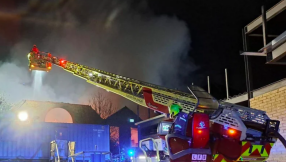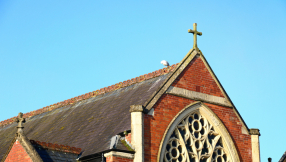Police stormed Catholic churches and fired tear gas during Mass in the Democratic Republic of Congo on Sunday, it has emerged, as protests organised by lay Catholic activists against the rule of president Joseph Kabila intensified and at least eight were killed.
What happened at the churches on New Year's Eve?
A witness at St Michael's Church in central Kinshasa, the capital, told AFP that officers broke up the Mass and arrested altar boys, still in their liturgical robes, who had previously been protesting against the president.
'While we were praying, the soldiers and the police entered the church compound and fired teargas at the church,' the witness said.
Another added: 'People fell, first-aiders are resuscitating old ladies who have fallen' – but all the while the priest continued saying Mass.
Meanwhile, it emerged that police had beaten and robbed Catholics when they sought refuge in his church, shooting out its stained-glass windows. The rector of Kinshasa's St Alphonse Parish, Mgr Hugues Ndongisila, told Radio France Internationale that the bodies of two dead protesters had later been collected by the Red Cross.
What and who are behind the violence?
The clashes, in which security forces have targeted Catholic protesters, have left at least eight dead and 120 people detained.
The December 31 protest against Kabila's rule – which began in 2001 – was organised by the Kinshasa archdiocesan lay coordination committee. At least a dozen priests are reportedly among those detained.
How has the Church responded?
Yesterday, the Congolese bishops' conference said in a statement: 'We condemn with utmost vigour this unjustified violence. We similarly denounce this attack on freedom of worship, which is guaranteed in every democratic state, as well as the profanation of churches and physical aggression against the faithful and their priests.'
The statement added that the bishops were 'profoundly shocked by such ignoble acts' and would demand a 'serious and objective inquiry'.
And in a rare appearance before the media, Cardinal Laurent Monsengwo, wearing a red prayer cap and gold cross, accused security forces of opening fire on peaceful protesters and desecrating places of worship.
'We can only denounce, condemn and stigmatize the actions of the supposedly valiant men in uniform, which are, unfortunately, nothing more, nothing less than barbarism,' Monsengwo told reporters in Kinshasa.
'How can we trust leaders incapable of protecting the population, of guaranteeing peace, justice and love of people?'
What international reaction has there been?
A UN spokesperson confirmed that seven deaths had been recorded in Kinshasa and another at Kananga.
The violence was condemned by the UN Secretary-General Antonio Guterres, who urged Kabila's government to show restraint and 'respect the rights of Congolese people to free expression'.
What is the role of the Catholic Church in Congolese society?
According to Reuters, the Catholic Church is one of the few institutions in Congo to enjoy broad credibility. Some 40 per cent of the population identifies as Catholic and the Church has long filled voids in education, healthcare and other services left by an absent state.
Its bishops have frequently spoken out against human rights abuses by the government and alleged plans by Kabila to remove term limits that forbid him to run for re-election.
But hasn't the Church also acted as mediator?
When Kabila's mandate expired in December 2016 the Church brokered a deal between the ruling coalition and opposition leaders.
Under the December 31 agreement, Kabila was permitted to stay in office beyond the expiry of his mandate but required to step down after an election to be held in 2017.
Instead, Congo's electoral commission said later that the election could not be organised until December 2018, reviving suspicions that Kabila intends to cling to power. Kabila denies those charges and blames the delays on a slow voter registration process.
What next?
Dozens have died in protests over Kabila's future in the past two years and militia violence across the country has also risen, stoking fears the country will slide back into the kind of civil war that killed millions at the turn of the century.
Additional reporting by Reuters.













